Is this Typical? Feeding Therapist FAQs with Dawn Winkelmann, MS, CCC-SLP
In this episode we're talking about:
- What to do if your baby is not interested in bringing the food to their mouth
- Why babies chew on the wrong end of the spoon…and why that is ok!
- How babies learn to move food around their mouth and eventually chew and swallow
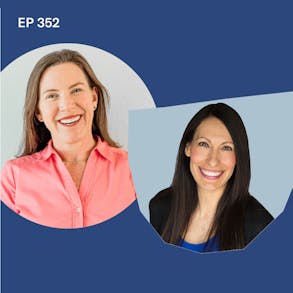
LISTEN TO THIS EPISODE
Episode Description
My baby gnaws on the wrong end of the spoon…and shoves fistfulls of food in her mouth…and has no interest in holding his own cup. Is this typical? Feeding Therapist Dawn Winkelmann, MS, CCC-SLP is here to answer speech and swallow questions related to starting solid foods in this rapid-fire Q&A interview.
About the Guest

- Dawn Winkelmann, MS, CCC-SLP is a feeding therapist and baby-led weaning expert
- Dawn is an award winning product designer for many of the ezpz feeding products
- She recently designed the ezpz Tiny Pops for pre-feeding breastmilk and/or formula
- …and Dawn designed the ezpz Oral Development Tools for pre-feeding skills
- You can get 15% off everything at ezpzfun.com with affiliate discount code: BABYLED
Links from this Episode
- ezpz Tiny Cup for babies 6-12 months
- ezpz Tiny Pops for babies 4-12 months
- ezpz Tiny Spoon for babies 6-12 months
- ezpz Oral Development Tools for babies 4-12 months
- ezpz Mini Utensils for babies 12-24 months
- Baby-Led Weaning with Katie Ferraro program with the 100 First Foods™ Daily Meal Plan, join here: https://babyledweaning.co/program
- Baby-Led Weaning for Beginners free online workshop with 100 First Foods™ list to all attendees, register here: https://babyledweaning.co/baby-led-weaning-for-beginners
Other episodes related to this topic:
- Episode 101 - Straw Cup vs. Open Cups: Which Comes First? with Dawn Winkelmann, MS, CCC-SLP https://blwpodcast.com/101
- Episode 54 - Overstuffing: What If My Baby Takes Big Bites? with Dawn Winkelmann, MS, CCC-SLP https://blwpodcast.com/episodes/54
- Episode 152 - How Do I Know if My Baby Needs Feeding Therapy with @msdawnslp Dawn Winkelmann, MS, CCC-SLP https://blwpodcast.com/episodes/152

Latest Episodes
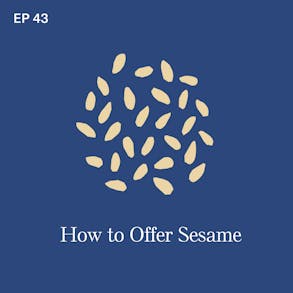
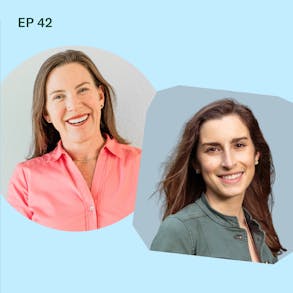
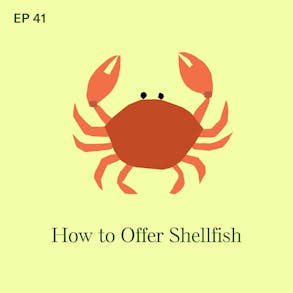
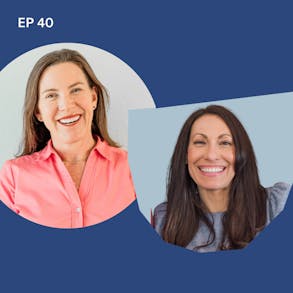
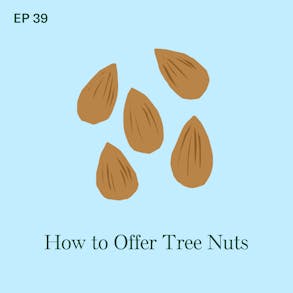
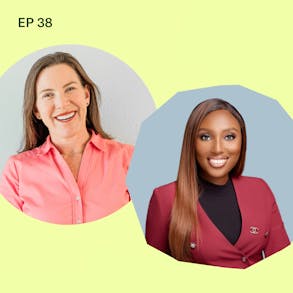
Babyledweaning (1s):
How are you feeling about your baby's transition to Solid Foods? I was just talking to a mom of nine-month-old twins and she said she's terrified to let them eat anything except purees. And I know how frustrating it can feel when your baby is ready, but you are not. And if this is you, I wanna invite you to my one hour online video workshop training called Baby-led Weaning for Beginners. I think this training is gonna ease a lot of anxiety for you about starting Solid Foods safely, and I just redid this training. It's packed with videos and visuals on how to prep foods for your baby, what the foods should look like, and what's happening for the first few days, how to reduce choking risk. And then everybody on this free training gets a copy of my 100 FIRST FOODS list, so you'll never run out of ideas of Foods Your baby can eat next, you can get signed up for this week's video workshop times at https://babyledweaning.co. If you've got an hour to dedicate to learning about starting Solid Foods, come take this free online training. Grab your copy of the 100 FIRST FOODS list while you're there. Sign up at https://babyledweaning.co.
The Spice House (1m 1s):
Do babies need to eat bland food? Heck no. Seasoning your baby's food is a great way to introduce new flavors. We just wanna steer clear of added sugars, excess salt, or anything super spicy that could be harmful to your baby. So when I'm cooking food for babies, I love to use the salt-free seasonings from the Spice House. The Spice House has been around since 1957 and they sell the finest spices, herbs, blends, and extracts to customers that range from Michelin star chefs to brand new Moms. Spice House has this salt-free spices deluxe gift set. It's my go-to for seasoning Foods that your baby can eat. And right now you can get 10% off everything at https://thespicehouse.com with my brand new affiliate discount code BLWT. So If, you have no idea how to season food. Check out their essential Spices collection, but don't pass on that solve free line. It's awesome. The code again, BLWT for 15% off at https://thespicehouse.com. And don't be shy about seasoning your baby's food.
Dawn Winkelmann (2m 2s):
Raspberries tell me that baby is exploring their aura motor skills. Raspberries tell me that baby is exploring their saliva, which is a liquid that your baby needs to learn how to swallow and manage an airway. This lets me know that your baby is exploring respiration, which is a precursor to speech.
Katie Ferraro (2m 20s):
Hey there, I'm Katie Ferraro, Registered dietitian, college nutrition professor and mom of seven specializing in baby-led weaning here on the Baby Led Weaning Made Easy podcast. I help you strip out all of the noise and nonsense about Feeding leaving you with the confidence and knowledge you need to give your baby a safe start to Solid Foods using baby-led weaning. I have a fun episode for you guys today. I have been keeping a list of questions for my friend, Dawn Winkelmann, who's a speech-language pathologist and Feeding Therapist. She also has a specialty area in baby-led weaning. She's the product designer for Easy Peasy, the company that makes the silicone suction, Matson bowls, and all the pre Feeding tools that you guys are perhaps using with your own babies.
Katie Ferraro (3m 8s):
And Dawn and I have worked together over the years doing various types of education and speaking. We do a lot of talks for different health professional organizations in our respective fields, but it's really fun to team up with her cuz I'm a dietitian. So I have the nutrition background, she's a speech-language pathologist, so she brings kind of the physiology of how babies learn to chew and swallow. And so this list of questions that I had been keeping, I was like, I'm gonna make this into a podcast episode to share it with Dawn. So we have a weekly live office hours component of our online baby-led weaning program where parents come on every week, they can submit their questions either ahead of time or ask them live and then I answer their specific questions about their baby. And so sometimes when they have, you know, speech-language pathology or Feeding Therapist specific questions that is outside of the scope of my practice, I'll be like, hang on, I'm gonna ask these to Dawn.
Katie Ferraro (3m 53s):
So I made a recording for the parents and caregivers in my office hours group, but I want to kind of just share that with you guys as well. so you could see well a, what it's like to get specific answers to your questions. And then also I reached out to my Instagram community too, like what other questions do you guys have about chewing and swallowing for Dawn? So this episode is kind of a compilation of all of that and it's entitled Is this Typical. And so we're asking Dawn Winkelmann some Feeding Therapist questions. With no further ado, here's Dawn.
Dawn Winkelmann (4m 27s):
Hi Katie, thank you so much for having me here again. Okay,
Katie Ferraro (4m 30s):
I have been amassing questions for you. Like every time I talk to you I have a list of questions that I wanna know, but this time I surveyed our audience and Instagram and got some questions that I know you are the right person to answer. So if it's okay, I'm just gonna start firing these at you. I've already done an intro. Everyone knows who you are and what your area of expertise is. When do babies need to start using a fork?
Dawn Winkelmann (4m 50s):
Okay, so from a developmental and safety standpoint, we should not expect babies to use a fork, although some babies may be ready to start early, which is why the products that I designed for first Foods for baby-led weaning do not include a fork. However, toddlers are expected to learn how to sell feed with a fork. So I start to introduce a fork around baby's first birthday. And when parents are looking for a fork for toddlerhood, not for infancy, we're looking for features of the first fork to be that we want the fork to be able to have the ability to pierce, but also the ability to scoop because babies are kind of learning both of those movements. And so it's easier to do that If, you have a fork that kind of allows that.
Dawn Winkelmann (5m 34s):
We want the tines to be slightly rounded because baby is learning the motor planning of how to be able to put that fork into their mouth. And so we wanna make sure that it's rounded so it doesn't pierce the Oral cavity. We wanna make sure that that handle is a short fat round handle that actually supports their whole palm, not just like a three finger grasp but their whole palm. And then lastly, we want the fork to have sensory bumps to support tactile learning and increase safety. There's a lot of spoons and forks on the market that have like a choking guard. And unfortunately what that does is that it can knock out baby's emerging teeth, but it also doesn't allow them to grade to see how far to put that fork into their mouth.
Dawn Winkelmann (6m 19s):
So we want to have some sensory bumps that kind of just give a little bit of stimulation but doesn't stop them from actually putting it into their mouth because that is part of the learning process is we want them to be able to kind of bring that fork to their mouth and start to be able to have that hand in mouth Coordination then increases safety.
Katie Ferraro (6m 36s):
And you make an interesting point about that choking guard is that you know, we've, we've tried to look more into this, there's absolutely no data to support that and that's just marketing jargon. And so if you know that from a developmental standpoint your baby doesn't need a fork, when you see a product marketed to babies, which is, which are children less than 12 months of age is a fork, it's actually not developmentally appropriate. But when it says choking guard on parents think, oh this is good for my baby. But there's certainly nothing to support that statement.
Dawn Winkelmann (7m 2s):
Absolutely. And really the best way to prevent choking is to make sure that your baby has a Oral musculature in order to protect their airway. So when we use tools like that that have a choking guard and it doesn't allow them to grade their hand and mouth movements, it doesn't allow them to grade that utensil within their Oral cavity, it actually can backfire and cause more causes for concern.
Katie Ferraro (7m 26s):
Next question. Should I do open cup or straw cup first for my baby?
Dawn Winkelmann (7m 31s):
So developmentally we want to initiate the motor planning of open cup movements. So we want to really facilitate open cup learning. It's a developmental milestone just like walking, we want babies between four and six months of age to start to drink from an open cup held by an adult. So the adult is controlling that cup. So parents never have to worry about spillage cuz they're the ones that are in control of that. And we're just gonna put breast milk or formula into that open cup and start there first because developmentally we want the lips to learn how to close first before we want them to learn how to round. So lip closure is with open cup drinking, lip rounding occurs with straw drinking.
Dawn Winkelmann (8m 16s):
So we want to then after we've mastered that lip closure with open cup drinking, we can start to introduce a straw. Now, generally speaking, we introduce a straw around nine months of age. We introduce open cup drinking between four and six months of age. So that baby has really mastered that lip closure. But if babies really start to get the hang of Straw drinking a little bit earlier and you're offering babies open cup multiple times a day, some babies can actually start to introduce Straw drinking a little bit earlier. But again, we want to make sure that that liquid is breast milk or formula in order to really facilitate these developmental milestones instead of filling baby up with water or juices or anything like that, we really want that to be breast milk or formula
Katie Ferraro (9m 3s):
And If. you guys want more information on why the open cup precedes the Straw cup. Dawn actually did an entire episode here on our podcast episode 101. She did open cup versus Straw cup, which one comes first and she kind of goes into more of the detail. So Dawn, what about babies who shove handfuls of food? My mom asked my baby shoves handfuls of food in his mouth and it freaks me out. How can I stop this?
Dawn Winkelmann (9m 23s):
So that can be scary because you know parents are usually panic cuz they're just like, oh my gosh, my baby, you know, has an increased chance of choking. It's a common fear and it's actually one of the most common reasons why parents contact me for Feeding therapy. But I always tell families before you set up an expensive you know, therapy system, I encourage them to try different activities that they can do in their own kitchen first. So I'll give you a couple. First you want to offer small amounts and make sure that the Foods that you're offering, if you're doing baby-led weaning is the length and thickness of an adult pinky finger. If that piece is bigger, if that piece is longer, if that piece is wider, then what happens is that babies will shove more hand fills of that food into their mouth and really overstuff their mouth because of the fact that it's not skinny enough to actually go onto the gumline.
Dawn Winkelmann (10m 19s):
So since it doesn't fit onto the gumline, they're, they're trying to get all that input by filling up their whole entire mouth. So really try to hone in on small amounts and making sure that it's the length and thickness of an adult pinky finger. The second thing would be to offer multiple temperatures. So the tiny Pops is a product that I designed for easy peasy it you can freeze breast milk or formula or purees and that can really help awake and alert the mouth to all of those sensations that we really need in order to decrease baby needing to shove the food into their mouth. Cuz a lot of babies will overstuff their mouth because they're just trying to feel where their mouth is in space and we can actually give them that sensory exposure that they're looking for by offering different temperatures.
Dawn Winkelmann (11m 5s):
You can do that with frozen popsicles, you can do that with open cup drinking. And so those are two ways to be able to help facilitate that.
Katie Ferraro (11m 12s):
My baby takes pinky sized pieces of food and then smashes them up. Can he eat the smaller pieces he smashes off if he's only seven months old or will he choke?
Dawn Winkelmann (11m 21s):
What's exciting about the way that this question is phrased is I just love that a mom was like, you know, really saying that the baby is doing all these things right? So there's a big difference and again this is the foundation of baby-led weaning. There is a big difference of us taking very small pieces of food and putting 'em into baby's mouth and that can actually increase choking risk, right? But when a baby takes those pieces of food that use so painstakingly cut prepared, making sure that it's the right size and the baby just smashes it up, I call it the Hulk smash in their fist and then just shoves it into their mouth, that actually is safe because of the fact that baby is getting all of the sensory input from their hand and they're putting it into their mouth.
Dawn Winkelmann (12m 5s):
And so it's really increasing the sensory properties of that food, it's increasing the motor planning of what baby's doing. And so that actually is safer than us just offering small pieces of food and putting it into baby's mouth. So it's going to be okay mama, because your baby is really getting all of the planning that they need in order to be able to protect their airway and be able to eat and chew safely.
Katie Ferraro (12m 30s):
Hey, we're gonna take a quick break but I'll be right back.
Katie Ferraro (13m 11s):
My six-month-old daughter has no interest in holding her own cup. How long do I have to help her for?
Dawn Winkelmann (13m 16s):
So the developmental milestone is that babies will drink from an open cup held by an adult between four and six months of age. So we are going to hold that cup for the baby in order to help them learn how to drink from the cup. Eventually you'll see your baby start to put their hands alongside you with the open cup and the developmental milestone is that by 12 months of age baby will be completely independent. So you're saying that, you know, how long am I gonna have to to hold the cup for with my six month old developmentally until your baby's first birthday? But if you're using the tiny cup that I designed for Easy Peasy, which is a baby-led weaning cup, it's first cup for babies, it's made out of food grade silicone and it's cone shaped, cone-shaped on the inside to allow the liquids to come out and baby never has to tilt their head back in order to keep their airway protected.
Dawn Winkelmann (14m 12s):
And the cup is weighted on the bottom and it has sensory bumps on the bottom to actually help baby learn how to hold that. I call it topal resistance. It gives a a lot of weight there to help make that a little bit easier for babies to manage. And we're finding that babies are actually becoming independent with open cup drinking using our cup around eight months of age, which is really, you know, mind blowing because you know the milestone is 12 months of age. But this is a great example of of having education and science behind a product that could actually help facilitate those milestones earlier. And don't worry mama, if your baby is still not holding the cup independently by themselves, you know at eight, nine months of age, it's totally fine.
Dawn Winkelmann (14m 54s):
The developmental milestone is 12 months. So you know, just practice for a couple more months and and watch your baby really grow into that skill.
Katie Ferraro (15m 3s):
Speaking of eight-month-olds crushing the open cup. So a couple months ago I went to Boston with my girls to visit a friend whose baby was starting Solid Foods. We did five new foods over the course of the weekend just showing how working families can make this approach work and they were starting to practice their open cup and it was like not going great. She sent me a video yesterday, like ultimate party trick, like baby is drinking the formula straight up out of the cup like textbook and then finished it in like, it's like his equivalent of a mic drop but like the cup smash on the table. I'm gonna send you this video cuz it's so adorable. And she's like, I can't believe how much better he got at this. And just like it was almost three months at this point. But like it's so cool to see him be able to do that. And she said I would've had no idea that we should have even started practicing unless you had told me that.
Katie Ferraro (15m 44s):
And also it wasn't pretty at the beginning, but just a few months later, like he totally has this and she's like, I can definitely have him off the bottle by 12 months, which is her goal. Okay mom from Instagram, Jenny Coza asked my baby, puts food in their mouth and then puts the fingers in the mouth to help swallow. Is this okay?
Dawn Winkelmann (16m 0s):
So if baby is initiating that to kind of push the food back, that generally as a Feeding Therapist is indicative to something going on with the tongue. So I would encourage you to go to a pediatric dentist or a speech language pathologist and have them assess your baby's tongue to be able to see if some intervention is needed. Sometimes babies will use their fingers because their tongue can't elevate. So it could be something structural like a tongue tie or it just could be something that you can actually work on in your own kitchen. I'm always like excited to give parents like ideas and tips to be able to implement.
Dawn Winkelmann (16m 41s):
so you could use what's called the Oral development tools by Easy Peasy. And those Oral development tools actually help to facilitate tongue elevation. And so that tends to be where babies are having some difficulties. so you can utilize that to be able to help baby, baby kind of munch and chew and really learn how to be able to move their mouth and kind of get their blood flow going into the mouth in order to help baby not have to use their fingers to actually push the food back to propel that, to initiate a swallow, but actually really engage the lips and the tongue to be able to help them do that independently.
Katie Ferraro (17m 19s):
My baby bangs with and sucks on the wrong end of the spoon. Should I be turning it around for her or let her go?
Dawn Winkelmann (17m 25s):
As adorable as that looks, I find it to be adorable. Parents find it to be very irritating, but please know that that is developmentally appropriate. So there are spoon milestones for babies at six months of age. Babies supposed to bring a preloaded spoon to their mouth and be able to feed themselves with that spoon. But the milestones prior to that is that baby is supposed to mouth the entirety of that object. So this is the only way that baby learns how to explore things in their environment. So if they're chewing on the handle, mouthing it, kind of making, you know, la, la la movements with their mouth, with the spoon, that is absolutely typical and really important for them to be able to help protect their airway.
Dawn Winkelmann (18m 11s):
Having babies really make sure that they can explore the items that are gonna go inside of their mouth is really another pre feeding tool. so you can have your baby explore the spoon before mealtime so you can put them in the high chair, give them the spoon while you're kind of finishing the rest of the meal and cutting things up so that baby has time to be able to explore that spoon. So when you offer food at the mealtime, then baby's just ready to be able to go ahead and start to use that spoon correctly.
Katie Ferraro (18m 41s):
My baby won't touch wet or sticky Foods does this mean she has a sensory disorder or a food aversion?
Dawn Winkelmann (18m 48s):
How our brain understands sensory input, for example, you know, movements during mealtime, touching, Foods, hearing Foods, smelling Foods, tasting Foods, and visually seeing Foods. This, all of that is called sensory processing. And if a child has difficulties processing that information, then they may have a sensory processing disorder, but most sensory processing, it really plays an important role in mealtime success. We want baby to understand that sensory processing and really get engaged in mealtime. And most of these babies just need to be taught about these different types of textures during sensory play.
Dawn Winkelmann (19m 32s):
So parents see that, you know, big like, oh, sensory issues, my my baby might have sensory processing and that's n that can occur. But with most babies out there, all they need is a little bit more exposure that does not coincide with the pressure that happens at mealtime. so you can still have your three meals a day with your baby and do some sensory food play in different times. So babies need to explore their senses to foster brain maturation within a food environment. So sensory food play gives them an early love for food and an early love for this type of exposure. For example, if we put hummus and yogurt on the high cherry tray for example, the yogurt is going to be wet and sticky, right?
Dawn Winkelmann (20m 19s):
Where the hummus is going to have more weight and have a more mass, right? And have more of a handful. That really gives baby a lot of information about food and exploring those wet textures again without the pressure of them being hungry, without the pressure of our expectations that happen at mealtime. So baby can get a lot of information from this and really can help with that aversion to those textures. Using another example, a whole banana and you know, a cooked sweet potato, right? That again, they're both soft Foods, right? But you know, the sweet potato may be warm and the banana may be room temperature or cold. And so giving baby the chance to kind of mash and explore that again is going to really help with that kind of stickiness and that aversion to that stickiness to allow them to have some exposure to that.
Dawn Winkelmann (21m 12s):
Having that food go in between their fingers and really working on their raking grasp and other really important mealtime milestones that again, sometimes babies need to have that exposure outside of mealtime. So they have, it's just a little bit more comfortable. You can do this in the highchair, you can do this outside to allow babies to really have that sensory activity. And If, you continue to do this with your baby and you're offering these sensory play experiences and you're not seeing that your baby is enjoying that or starting to feel a little bit more comfortable, then you can reach out to an occupational Therapist. Occupational Therapist specialize in sensory processing and they can give you more tips to be able to help that.
Katie Ferraro (21m 56s):
Hey, we're gonna take a quick break, but I'll be right back.
Katie Ferraro (22m 51s):
All right, this is the last question. It's from a mom, Tricia. She is in one of my groups and asked this on our live weekly office hours call last week and asked me to ask you, cause I said I was gonna be talking to you. My 10 month old is blowing raspberries with their food and cup all the time. Now it's annoying. What should I do?
Dawn Winkelmann (23m 7s):
That actually is a developmental milestones like raspberries. Tell me that baby is exploring their aura. Motor skills, raspberries tell me that baby is exploring their saliva, which is a liquid that your baby needs to learn how to swallow and manage and an airway, right? So this lets me know that your baby is exploring respiration, which is a precursor to speech. So this coincides developmentally raspberries coincides with speech and Feeding, right? So developmentally, raspberries and your baby kind of exploring that happens anywhere between four and 12 months of age, right? So, and between four and 12 months of age, the mouth is having a lot of sensory changes, right?
Dawn Winkelmann (23m 52s):
We're getting ready to start Feeding at six months. These movements, these raspberry movements are the precursors to speech precursors, to language precursors to vocabulary. It's the type of communication like gurgling and cooing. Babies will start to blow raspberries and spit bubbles as a way to start to facilitate movements of the lips. So it's gonna help you with open cup drinking and Straw drinking. So I know that it sounds irritating, but this developmentally, this is letting you know that your baby is about ready to start babbling to you and maybe saying Mama, and actually really showing you, hey, guess what, mom, dad, I, I'm mastering these mouth movements and I'm ready to be able to start to target other movements of the mouth.
Dawn Winkelmann (24m 41s):
you know, we want babies to show us their readiness cues, right? To be able to move on to other things. so you might wanna start introducing that Straw cup. You might want to start introducing a variety of temperatures now that your baby is really exploring raspberries and and showing you that they can really move their mouth for speech chewing and drinking.
Katie Ferraro (25m 4s):
So Dawn for parents who've heard something here that kind of sparked their interest, like, gosh, you know, maybe what my baby's experiencing is not typical and I should reach out to a Feeding Therapist. How can listeners find a Feeding Therapist? How can they work with you If, you are taking new clients. And then in a broader sense, if they're not in your area or they're not interested in telehealth, how do you get in touch with a Feeding Therapist if what you're experiencing is not typical?
Dawn Winkelmann (25m 25s):
Yeah, you can go to your pediatrician and ask for a referral to a speech language pathologist. Speech language pathologists are the trained professionals to help child children with Feeding and swallowing problems. Feeding and swallow disorders include problems with sucking, eating from a spoon, chewing drinking from an open cup or a straw cup. Swallowing disorders is called dysphagia and that is difficulties moving liquid or food from the mouth to the stomach. And so speech language pathologists as well as occupational therapists specialize in that. So your pediatrician can refer you to an SLP or OT or if you're interested in telepractice, I do that, do parent coaching.
Dawn Winkelmann (26m 5s):
so you can reach out to me at https://msdawnslp.com/, that's my website, https://msdawnslp.com/, and I can absolutely help you or help you find someone in your area.
Katie Ferraro (26m 16s):
And we also had you on a while back, Dawn, you did a whole episode about how do I know if my baby needs Feeding therapy? If. you guys are interested in learning more about Feeding therapy, that's episode 152 and Dawn, thank you so much as always for sharing all of your resources and your time and your expertise in answering these questions. It's so helpful to parents and I thank you a lot.
Dawn Winkelmann (26m 35s):
Thank you so much.
Katie Ferraro (26m 37s):
Well, I hope you guys enjoyed that interview with with Dawn Winkelmann. She is such a wealth of knowledge and she's so generous with her time. She's like, I could go on and on and do this forever and ever. I was like, yeah, I know, but we need to cut the episode off. So maybe we'll do a part two. And I think we're gonna do a whole separate episode on spout less lid cups too, because I think there's a lot of confusion about those parents think they're better than sippy cups, but Dawn has thoughts and I'll let her share those baby in a separate episode. So thank you guys for all of the reviews on the podcast. If, you have an idea for an episode you'd like to hear If, you could drop it in a review for this podcast on Apple Podcasts. I read every single review. I really appreciate your feedback and If, you wanna check out some of the other kind of subtopics that we were talking about. A lot of the questions that came in Dawn had already answered in previous guest episodes.
Katie Ferraro (27m 21s):
So I'm gonna link to all of the episodes that we mentioned that she'd previously been on in the description. So wherever you're listening to this podcast, just click into there and you can click to those different episodes or you can go to The show notes page for this episode at https://blwpodcast.com/352. And a thank you to our partners at Airwave Media If, you guys like podcasts that feature food and science and using your brain, AirWave Media has some wonderful podcasts to listen to if you're looking for something new in your earbuds there. And we're online at https://BLWpodcast.com. Thank you as always for listening. Thank you for the reviews, If. you have a second? If you've been listening and you're like, I actually enjoy this podcast, If, you could leave a review. It really, really does help the podcast get found by other parents, and if you've got an episode idea, drop it in there.
Katie Ferraro (28m 3s):
I appreciate all of your feedback and I appreciate you. See you next time.

The Program Baby-Led Weaning with Katie Ferraro
A step-by-step digital program for starting solid foods safely and navigating the original 100 FIRST FOODS™ meal plan with baby-led weaning.
 EXPERT-LED, PROVEN APPROACH TO EATING REAL FOOD
EXPERT-LED, PROVEN APPROACH TO EATING REAL FOOD CONCISE VIDEO TRAININGS TO MASTER BABY-LED WEANING
CONCISE VIDEO TRAININGS TO MASTER BABY-LED WEANING 100 FIRST FOODS DAILY MEAL PLAN WITH FOOD PREP VIDEOS
100 FIRST FOODS DAILY MEAL PLAN WITH FOOD PREP VIDEOS
Baby-Led Weaning for Beginners Free Workshop
Is your baby ready to start solid foods, but you’re not sure where to start? Get ready to give your baby a solid foundation to a lifetime of loving real food…even if you’re feeling overwhelmed or confused about this next stage of infant feeding.
Get baby-led weaning recipes and tips delivered to your email inbox.



